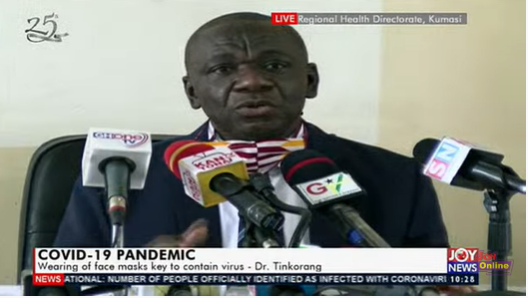The Ashanti Regional Director of the Ghana Health Service says the country can still win the fight against the novel coronavirus by strictly observing all laid down protocols and not necessarily through a lockdown.
Dr Emmanuel Tinkorang said adhering to social distancing, washing of hands with soap under running water and regularly using hand sanitisers are sure ways of preventing the spread of the virus.
“The wearing of face masks is so important, it protects you better. A lot of countries have used that and they have come out with a lot of success stories.
"I believe that we also have to adhere to this social distancing, wearing of face masks and obeying all the rules and regulations.
"This is the key. I know without the lockdown, if we do all this, the principle will be the same and we will all help to fight Covid-19.”
Speaking at a Press Conference held in Kumasi Tuesday, Dr Tinkorang urged residents in Kumasi and beyond to be careful as they are currently a large number of asymptomatic carriers moving around and possibly spreading the virus.
“The most important thing is that the rules and regulation still applies. The lockdown we all admitted was difficult, especially for the poor and the vulnerable so it is out of very good wisdom that the President decided that he is going to call it off.
"But as he said, that is not a reason to assume that the fight is over. The fight is not over at all, this is the time that we need to strengthen the fight and then we make sure that we all adhere by the rules and regulations and when we do that it is likely we may contain the infection.
“The proportion of asymptomatic carriers are many and it's unlikely that you will identify them because they themselves don’t know that they carry the virus.
He added that the service will not only be organizing mandatory quarantine for a specific group of people but will soon begin a voluntary testing exercise among frontline workers and others who are seen as high-risk groups.
“What we are going to do now is to strengthen surveillance and as part of that we have come up with certain strategies that we are going to embark on. We are going to be doing active contact tracing to test, isolate and follow up on all the positive cases.
"We will also have mass screening at certain hot spots in the region. They are areas where we have confirmed cases and all the households where we have isolated cases will go through voluntary testing.
"We are also considering testing high-risk groups and that will include frontline workers, drivers of both uber and commercial vehicles, market women and people who sell because they come into contact with a lot of people. They will also be enrolled into the voluntary testing and then the routine surveillance will continue,” he told the media.
Latest Stories
-
Report tobacco users who smoke publicly – FDA advises
21 minutes -
Abdallah Ali-Nakyea elevated to Associate Professor at UG School of Law
50 minutes -
Kick2build commissions 5 libraries in Klo Agogo, donates school supplies
57 minutes -
Slim and Fit Ghana donates to kids at Motherly Love Orphanage in Kwabenya
1 hour -
We’ll be reorganising ourselves for the battles of tomorrow – NPP
1 hour -
Ghanaian teacher Morkporkpor Fiador’s GWR Read-A-Thon attempt postponed
1 hour -
Revocation of licences of UT, Capital banks were strict requirements from IMF – Dr. Addison
1 hour -
MP Cynthia Morrison among 280 members expelled by Agona West NPP
2 hours -
NPP to set up committee to investigate 2024 election defeat – Stephen Ntim
2 hours -
New Juaben North NDC executives intercept 24k bags of fertiliser at Koforidua
3 hours -
Luigi Mangione pleads not guilty to murdering healthcare CEO
3 hours -
GhLA opens applications for 2nd Edition of Youth Advocacy Challenge
3 hours -
Remote Work in Africa; the Doballi solution
3 hours -
Stephen Ntim rallies NPP members after 2024 election loss
3 hours -
AratheJay ignites the night with mesmerising ‘Nimo Live’ debut concert
3 hours

